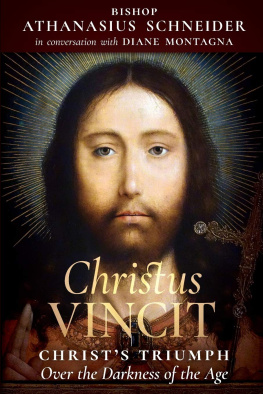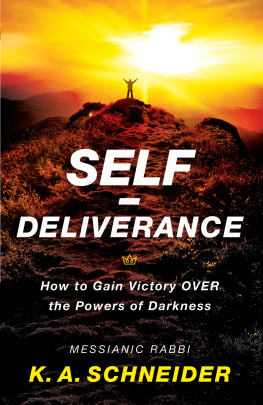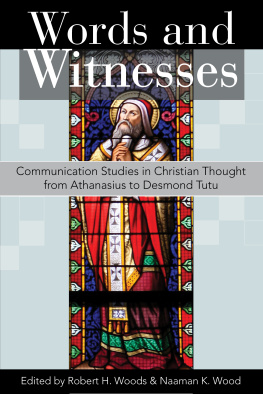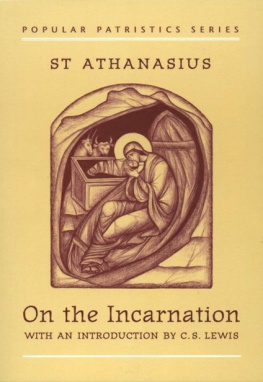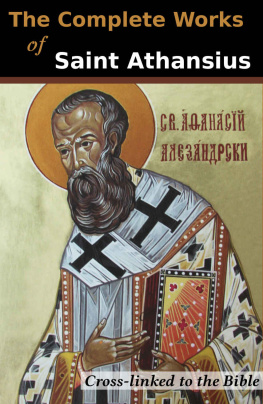Christus Vincit
First published in the USA
by Angelico Press 2019
Copyright 2019 Bishop Athanasius Schneider and Diane Montagna
All rights reserved:
No part of this book may be reproduced or transmitted,
in any form or by any means, without permission
For information, address:
Angelico Press, Ltd.
169 Monitor St.
Brooklyn, NY 11222
www.angelicopress.com
ISBN 978-1-62138-489-2 pbk
ISBN 978-1-62138-490-8 cloth
ISBN 978-1-62138-491-5 ebook
Book and cover design
by Michael Schrauzer
Cover image: Salvator Mundi,
by Quentin Metsys
(Wikimedia Commons)
To the Immaculate Heart of Mary,
Mother of God and Mother of the Church
To all the little ones of the Militant Church of our days, who as bishops, priests, religious, fathers and mothers of families, young people and children, have in the past decades been marginalized, humiliated, and punished for the sole reason of their unshakeable fidelity to the integrity of the faith and the liturgy of the Holy Mass.
God chose what is foolish in the world to shame the wise; God chose what is weak in the world to shame the strong; God chose what is low and despised in the world, even things that are not, to bring to nothing things that are, so that no human being might boast in the presence of God.
1 Corinthians 1:2729
CONTENTS
INTRODUCTION
For a number of years now, the interventions of Bishop Athanasius Schneider on the controversies raging in the Church have provided clarity and hope for beleaguered adherents of traditional Catholic teaching. Never before, however, has Bishop Schneider stepped back from the occasional intervention to unfold at length his own witness to that faith given once and for all to the saints (Jude 3) and conveyed to him by the martyrs of the Communist persecution. This book is offered as a vade mecum for the perplexed in these difficult times.
Christus Vincit (Christ conquers) is the first book-length interview with Athanasius Schneider, auxiliary bishop of St. Mary in Astana, Kazakhstan. Born Antonius Schneider on April 7, 1961, in Tokmok, Kyrgyzstan (USSR), Bishop Schneiders early years were spent in the Soviet underground church, before emigrating with his family to Germany. In 1982, he entered in Austria the Canons Regular of the Holy Cross, originally founded in Coimbra. He was ordained to the priesthood on March 25, 1990. Appointed to the episcopate by Pope Benedict XVI, in June 2006, at the age of 45, he was consecrated a bishop in St. Peters Basilica. Bishop Schneider speaks German, Russian, Portuguese, Spanish, English, Italian, and French, and reads Latin and Greek.
The bishops ancestors were Germans who migrated from Alsace to Odessa on the Black Sea Coast of the Ukraine. At the close of the Second World War, the victorious Stalin deported the Schneider family to the Krasnokamsk gulag in the Ural Mountains. Maria Schneider, the bishops mother, played a key role in the underground church and sheltered Blessed Oleksiy Zarytskyj, a Ukrainian priest who was martyred by the Soviet regime in 1963.
Like his fourth-century patron, St. Athanasius the Great, Bishop Schneider says things that others wont, fearlessly following St. Pauls advice: Preach the word, be urgent in season and out of season, convince, rebuke, and exhort, be unfailing in patience and in teaching (2 Tim 4:2). Many have been impressed by his conviction, zeal, and clarity, and his total dedication to his vocation as a Successor of the Apostles. The aim of this volume is to allow the reader to get to know Bishop Schneider better, and to convey how he views the world, the Church, and the perennial tension between the two.
The text is established on the basis of three main interviews. The first took place over the course of several days in January 2018 in Munich, where Bishop Schneider was visiting his mother, who is in the care of a community of religious sisters. The second conversation took place in May 2018 in Rome. The third took place in March 2019, also in Rome, after the ad limina visit of the bishops of Central Asia. Bishop Schneider then carefully reviewed the manuscript and refined and amended his reflections.
It is hard not to be struck by the bishops love for the Eucharistic Lord, his confidence in Christs triumph through those he calls the little ones, and his own willingness to imitate the Good Shepherd in laying down his own life, whether by daily sacrifice or the final extremity, for the flock of Christ.
The title Christus Vincit was Bishop Schneiders own choice. He was drawn to this Latin phrase especially because of the hope and encouragement it gives to the faithful. It also emerged during our conversation that, for him, it captures Christs use of the foolish things of this world to confound the wise (1 Cor 1:27). The subtitle, Christs Triumph over the Darkness of the Age, was inspired by the verse in the Prologue of St. Johns Gospel: The light shines in the darkness, and the darkness has not overcome it (Jn 1:5). As will become clear, this verse captures the arc of the narrative and the spirit of hope that imbues the text.
The book is divided into four parts, each with a title taken from chapter 24, verse 29 of St. Matthews Gospel. In his inaugural encyclical E Supremi, St. Pius X remarked that so serious was the gathering storm of error at the beginning of the twentieth century that he would not be surprised to hear that the Antichrist was already on this earth. The same pope would go on to describe Modernism as the synthesis of all heresies and the herald of the end time. The Church Fathers do not fail to give us a spiritual interpretation of the famous words of Our Lord: Immediately after the tribulation of those days the sun will be darkened, and the moon will not give its light, and the stars will fall from heaven, and the powers of the heavens will be shaken (Mt 24:29). The tribulation, St. Augustine tells us, will precede the great falling away. These things shall be after the tribulation of those days, not because they shall happen when the whole persecution is overpast, but because the tribulation shall be first, that the falling away may come after (Ep. 199, 39).
The Sun, Christ, will be obscured in the hearts of men, and the Moon, the Church, will no longer win mens hearts by her beauty. In that ungoverned fury of wicked persecutors, the Church shall not be seen. The stars, members of the Church who seemed reliable touchstones of orthodoxy, will fall from the true faith and the moral life. Many, who seemed to be shining in Gods grace, shall give way to their persecutors, and shall fall, and even the stoutest believers shall be shaken, St. Augustine tells us. And yet, like the fall of the rebel angels from heaven, it is a sign of the coming triumph of Christ (Lk 10:18).
Whether Our Lords words do refer to our days or not, their resonances in the experience of Bishop Athanasius Schneider and so many others are undeniable, and his insights into the apocalyptic challenges facing Christs flock in these days count as essential reading for those truly alive to the signs of the times.
Finally, I wish to offer my heartfelt thanks to all those who in any way helped with this book. God knows who they are and, in His love, will surely reward them. Over the course of this work, I have repeatedly been reminded of God the Fathers words to St. Catherine of Siena in the spiritual classic, The Dialogue of Divine Providence: Daughter, I could easily have created men possessed of all that they should need both for body and soul, but I wish that one should have need of the other, and that they should be My ministers to administer the graces and the gifts that they have received from Me.
Next page
